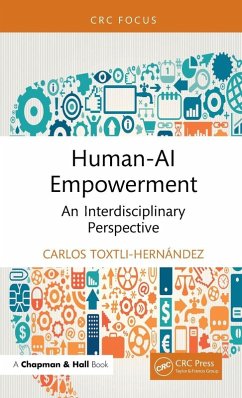- Gebundenes Buch
- Merkliste
- Auf die Merkliste
- Bewerten Bewerten
- Teilen
- Produkt teilen
- Produkterinnerung
- Produkterinnerung
This book provides a timely exploration of strategies for aligning Artificial Intelligence (AI) with long-term human goals, ensuring that AI acts as an empowering force across multiple dimensions. This volume is a key resource for academics and industry researchers in AI.
Andere Kunden interessierten sich auch für
![Science Communication in a Crisis Science Communication in a Crisis]() Christopher ReddyScience Communication in a Crisis149,99 €
Christopher ReddyScience Communication in a Crisis149,99 €![Transformative Practice in Higher Education Transformative Practice in Higher Education]() Transformative Practice in Higher Education46,99 €
Transformative Practice in Higher Education46,99 €![Science Communication for Scientists Science Communication for Scientists]() Laura Lindenfeld (USA Stony Brook University)Science Communication for Scientists55,99 €
Laura Lindenfeld (USA Stony Brook University)Science Communication for Scientists55,99 €![A New Approach to Research Ethics A New Approach to Research Ethics]() Henriikka Mustajoki (Finland University of Helsinki)A New Approach to Research Ethics52,99 €
Henriikka Mustajoki (Finland University of Helsinki)A New Approach to Research Ethics52,99 €![AI for Understanding Human Conversations AI for Understanding Human Conversations]() Yair NeumanAI for Understanding Human Conversations32,99 €
Yair NeumanAI for Understanding Human Conversations32,99 €![Projects in Linguistics and Language Studies Projects in Linguistics and Language Studies]() Alison WrayProjects in Linguistics and Language Studies55,99 €
Alison WrayProjects in Linguistics and Language Studies55,99 €![Ethnographies in Sport and Exercise Research Ethnographies in Sport and Exercise Research]() Ethnographies in Sport and Exercise Research69,99 €
Ethnographies in Sport and Exercise Research69,99 €-
-
-
This book provides a timely exploration of strategies for aligning Artificial Intelligence (AI) with long-term human goals, ensuring that AI acts as an empowering force across multiple dimensions. This volume is a key resource for academics and industry researchers in AI.
Produktdetails
- Produktdetails
- Verlag: Taylor & Francis Ltd
- Seitenzahl: 210
- Erscheinungstermin: 15. September 2025
- Englisch
- Abmessung: 222mm x 145mm x 15mm
- Gewicht: 344g
- ISBN-13: 9781032882024
- ISBN-10: 1032882026
- Artikelnr.: 74776824
- Herstellerkennzeichnung
- Libri GmbH
- Europaallee 1
- 36244 Bad Hersfeld
- gpsr@libri.de
- Verlag: Taylor & Francis Ltd
- Seitenzahl: 210
- Erscheinungstermin: 15. September 2025
- Englisch
- Abmessung: 222mm x 145mm x 15mm
- Gewicht: 344g
- ISBN-13: 9781032882024
- ISBN-10: 1032882026
- Artikelnr.: 74776824
- Herstellerkennzeichnung
- Libri GmbH
- Europaallee 1
- 36244 Bad Hersfeld
- gpsr@libri.de
Carlos Toxtli Hern¿andez is an Assistant Professor at Clemson University, where he focuses on the study of Human-Centered Artificial Intelligence. His research explores the intersection of artificial intelligence, human-computer interaction, and automation, with a particular emphasis on developing methodologies and frameworks for studying the long-term impact of AI on human empowerment. He has published extensively in leading academic journals and conferences, and his work has been recognized with numerous awards and grants. He holds a Ph.D. degree in Computer Science from Northeastern University.
Part I. Foundations of Human-AI Empowerment
* 1.1 Defining Human-AI Empowerment
* 1.2 Key Concepts and Theoretical Frameworks
* 1.3 The Evolution of Human-Centered AI
* 1.4 Ethical Considerations in Human-AI Empowerment
Part II. Frameworks for Human-AI Empowerment
* 2.1 Designing Longitudinal Studies for AI Impact
* 2.2 Measuring Empowerment
* 2.3 Qualitative Methods for Human-AI Interaction
* 2.4 Mixed-Method Evaluation Frameworks
* 2.5 Challenges & Limitations in Longitudinal Studies
Part III. AI Collaboration for Empowerment
* 3.1 AI Empowerment Approaches
* 3.2 HCI Methods for Long-term Engagement
* 3.3 Psychological Insights on Goal Management
* 3.4 Educational Strategies for AI-Enhanced Learning
* 3.5 Economic and Social Perspectives
Part IV. Case Studies and Empirical Evidence
* 4.1 AI in Healthcare: Empowering Patients and Practitioners
* 4.2 AI in Education
* 4.3 AI in the Workplace: Enhancing Productivity and Job Satisfaction
* 4.4 AI in Creative Industries
* 4.5 AI in Social Good: Addressing Global Challenges
Part V. Frontiers of Human-AI Empowerment
* 5.1 Emerging Technologies and Their Potential for Empowerment
* 5.2 Challenges in Scaling Human-AI Empowerment
* 5.3 Policy and Governance in AI Empowerment
* 5.4 Future Research Directions
* 5.5 Future of Empowered Human-AI Collaboration
6. Conclusion
* 6.1 The Symbiotic Relationship between Human and Artificial
Intelligence
* 6.2 The Imperative of Ethical AI Development
* 6.3 The Need for Interdisciplinary Collaboration
* 6.4 The Importance of Human-Centered Design
* 6.5 The Challenge of Scalability and Accessibility
* 6.6 The Role of Policy and Governance
* 6.7 The Potential for Addressing Global Challenges
* 6.8 The Imperative of Continuous Learning and Adaptation
* 6.9 The Exploration of Long-term Impacts
* 6.10 The Cultivation of AI Literacy
* 1.1 Defining Human-AI Empowerment
* 1.2 Key Concepts and Theoretical Frameworks
* 1.3 The Evolution of Human-Centered AI
* 1.4 Ethical Considerations in Human-AI Empowerment
Part II. Frameworks for Human-AI Empowerment
* 2.1 Designing Longitudinal Studies for AI Impact
* 2.2 Measuring Empowerment
* 2.3 Qualitative Methods for Human-AI Interaction
* 2.4 Mixed-Method Evaluation Frameworks
* 2.5 Challenges & Limitations in Longitudinal Studies
Part III. AI Collaboration for Empowerment
* 3.1 AI Empowerment Approaches
* 3.2 HCI Methods for Long-term Engagement
* 3.3 Psychological Insights on Goal Management
* 3.4 Educational Strategies for AI-Enhanced Learning
* 3.5 Economic and Social Perspectives
Part IV. Case Studies and Empirical Evidence
* 4.1 AI in Healthcare: Empowering Patients and Practitioners
* 4.2 AI in Education
* 4.3 AI in the Workplace: Enhancing Productivity and Job Satisfaction
* 4.4 AI in Creative Industries
* 4.5 AI in Social Good: Addressing Global Challenges
Part V. Frontiers of Human-AI Empowerment
* 5.1 Emerging Technologies and Their Potential for Empowerment
* 5.2 Challenges in Scaling Human-AI Empowerment
* 5.3 Policy and Governance in AI Empowerment
* 5.4 Future Research Directions
* 5.5 Future of Empowered Human-AI Collaboration
6. Conclusion
* 6.1 The Symbiotic Relationship between Human and Artificial
Intelligence
* 6.2 The Imperative of Ethical AI Development
* 6.3 The Need for Interdisciplinary Collaboration
* 6.4 The Importance of Human-Centered Design
* 6.5 The Challenge of Scalability and Accessibility
* 6.6 The Role of Policy and Governance
* 6.7 The Potential for Addressing Global Challenges
* 6.8 The Imperative of Continuous Learning and Adaptation
* 6.9 The Exploration of Long-term Impacts
* 6.10 The Cultivation of AI Literacy
Part I. Foundations of Human-AI Empowerment
* 1.1 Defining Human-AI Empowerment
* 1.2 Key Concepts and Theoretical Frameworks
* 1.3 The Evolution of Human-Centered AI
* 1.4 Ethical Considerations in Human-AI Empowerment
Part II. Frameworks for Human-AI Empowerment
* 2.1 Designing Longitudinal Studies for AI Impact
* 2.2 Measuring Empowerment
* 2.3 Qualitative Methods for Human-AI Interaction
* 2.4 Mixed-Method Evaluation Frameworks
* 2.5 Challenges & Limitations in Longitudinal Studies
Part III. AI Collaboration for Empowerment
* 3.1 AI Empowerment Approaches
* 3.2 HCI Methods for Long-term Engagement
* 3.3 Psychological Insights on Goal Management
* 3.4 Educational Strategies for AI-Enhanced Learning
* 3.5 Economic and Social Perspectives
Part IV. Case Studies and Empirical Evidence
* 4.1 AI in Healthcare: Empowering Patients and Practitioners
* 4.2 AI in Education
* 4.3 AI in the Workplace: Enhancing Productivity and Job Satisfaction
* 4.4 AI in Creative Industries
* 4.5 AI in Social Good: Addressing Global Challenges
Part V. Frontiers of Human-AI Empowerment
* 5.1 Emerging Technologies and Their Potential for Empowerment
* 5.2 Challenges in Scaling Human-AI Empowerment
* 5.3 Policy and Governance in AI Empowerment
* 5.4 Future Research Directions
* 5.5 Future of Empowered Human-AI Collaboration
6. Conclusion
* 6.1 The Symbiotic Relationship between Human and Artificial
Intelligence
* 6.2 The Imperative of Ethical AI Development
* 6.3 The Need for Interdisciplinary Collaboration
* 6.4 The Importance of Human-Centered Design
* 6.5 The Challenge of Scalability and Accessibility
* 6.6 The Role of Policy and Governance
* 6.7 The Potential for Addressing Global Challenges
* 6.8 The Imperative of Continuous Learning and Adaptation
* 6.9 The Exploration of Long-term Impacts
* 6.10 The Cultivation of AI Literacy
* 1.1 Defining Human-AI Empowerment
* 1.2 Key Concepts and Theoretical Frameworks
* 1.3 The Evolution of Human-Centered AI
* 1.4 Ethical Considerations in Human-AI Empowerment
Part II. Frameworks for Human-AI Empowerment
* 2.1 Designing Longitudinal Studies for AI Impact
* 2.2 Measuring Empowerment
* 2.3 Qualitative Methods for Human-AI Interaction
* 2.4 Mixed-Method Evaluation Frameworks
* 2.5 Challenges & Limitations in Longitudinal Studies
Part III. AI Collaboration for Empowerment
* 3.1 AI Empowerment Approaches
* 3.2 HCI Methods for Long-term Engagement
* 3.3 Psychological Insights on Goal Management
* 3.4 Educational Strategies for AI-Enhanced Learning
* 3.5 Economic and Social Perspectives
Part IV. Case Studies and Empirical Evidence
* 4.1 AI in Healthcare: Empowering Patients and Practitioners
* 4.2 AI in Education
* 4.3 AI in the Workplace: Enhancing Productivity and Job Satisfaction
* 4.4 AI in Creative Industries
* 4.5 AI in Social Good: Addressing Global Challenges
Part V. Frontiers of Human-AI Empowerment
* 5.1 Emerging Technologies and Their Potential for Empowerment
* 5.2 Challenges in Scaling Human-AI Empowerment
* 5.3 Policy and Governance in AI Empowerment
* 5.4 Future Research Directions
* 5.5 Future of Empowered Human-AI Collaboration
6. Conclusion
* 6.1 The Symbiotic Relationship between Human and Artificial
Intelligence
* 6.2 The Imperative of Ethical AI Development
* 6.3 The Need for Interdisciplinary Collaboration
* 6.4 The Importance of Human-Centered Design
* 6.5 The Challenge of Scalability and Accessibility
* 6.6 The Role of Policy and Governance
* 6.7 The Potential for Addressing Global Challenges
* 6.8 The Imperative of Continuous Learning and Adaptation
* 6.9 The Exploration of Long-term Impacts
* 6.10 The Cultivation of AI Literacy








